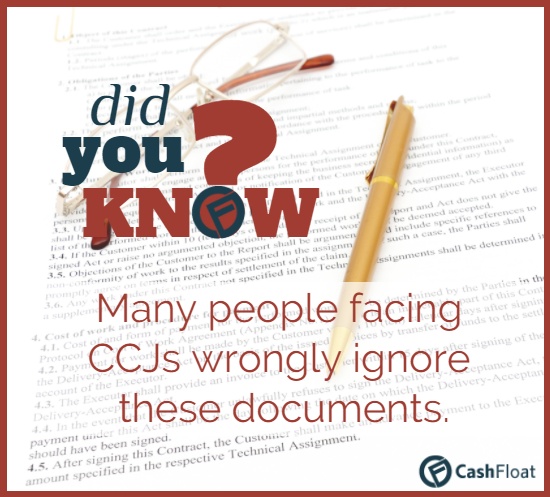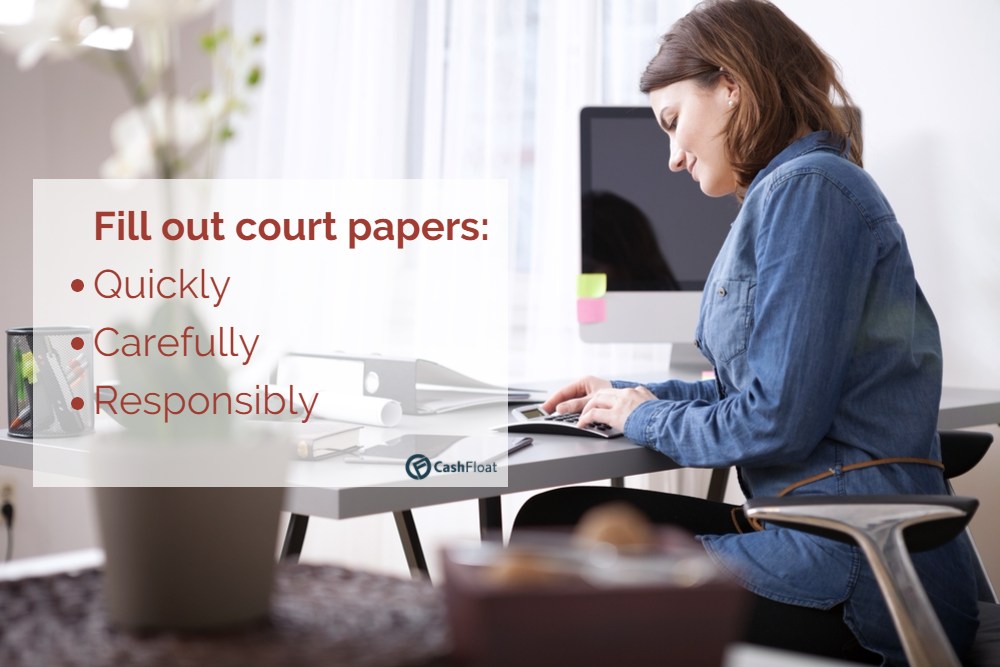Over 560,000 people in the UK get a CCJ every year, many of whom without even knowing about it. With payday loan lenders so often in the news, some are convinced that they are driving the rise in CCJs. But, it turns out, most CCJs are the result of unrelated issues.

CCJ, or County Court Judgements, are an order for a person to repay a debt, imposed by a judge. This can be taken out by anybody, from companies to lenders, and even other people. CCJs are usually for relatively large amounts. The average CCJ, for instance, is for around £3,300. But because they are cheap to obtain, they can be used to collect much smaller debts, like the failure to pay a parking ticket.
What Happens When You Get Taken To Court For Debt
If you owe money, but don’t pay it back, there’s a risk that you could be taken to court. In the legal jargon, this is called “making a claim.” When your creditors take you to court, it’s often a serious matter. You could end up paying a lot more money in additional fees than you already owe. And you could ultimately end up having your possessions repossessed or losing your home. As a result, it’s critical to act immediately, if you have a County Court Judgement filed against you. You can check out this article on teh Money Helper website for more extensive information on dealing with CCJs.
Often, banks and building societies will take you to court for debts that remain unpaid. More often than not, these case are dealt by a county court judge. If the judge finds that the creditor’s case against you is valid, they’ll then issue a county court judgement. This is an order given by the judge telling you that you must repay the debt you owe.

Following the obtaining of a CCJ, a company can enforce the CCJ in one of 4 ways:
This is probably the most common way of enforcing a CCJ. If you obtain an attachment of earnings order, this will ensure that your creditor gets a chunk of your salary before it even gets to you. Aside from making you feel that you are not in control of your finances, this may also prove embarrassing. This is because your debt is no longer a private matter, but becomes known to your workplace too. Furthermore, if your employer does not comply fully with the court’s order, they can be summoned to court and get fined. As this presents the employer with yet more complications, your employer will not be so happy with having you employed by them.
An attachment of earnings can be suspended, provided you fill out the forms mailed to you correctly. It is strongly suggested that you send your post by recorded delivery to ensure that the court receives it in good time.
Your creditor can also request a warrant. The court will then instruct you to pay off your debt within 7 days. Failure to pay will result in bailiffs coming round to your home or business and seizing property that they will sell at an auction to cover the debt owed. You can also suspend a warrant with the consent of the creditor.
This is when your creditor applies for the money in your bank account to be frozen. The money owed to them is then withdrawn from your account. To avoid you taking the money out before your creditor, you will only receive a copy of the order once your account is already frozen.
This prevents you from selling any of your assets before you have paid your creditor. This type of order does not normally take money from you immediately, but can be inconvenient when you finally want to sell an asset.
The creditor will pay for all court fees, but then add it to the debt owed. It is advised to comply with all court orders to avoid being fined.
The Obligations Of The Creditor
Before going to the county court judge, the creditor is obliged to send you a warning letter. The letter should contain information about how much money you owe and when exactly they intend to begin legal proceedings. Depending on the type of debt that you owe, you’ll get one of two different letters. You’ll either get a default notice if you’ve been unable to repay credit card debt. Or you’ll get a letter before action if you owe a debt to a trader or other group.
In some cases, lenders may decide to go ahead with court action. But if you haven’t received a warning letter or that letter is incorrect in some way, the creditor may not be able to take further action. Thus, when you get a warning letter, the first thing to do is to check it over to make sure that all the details are correct. If you’re unsure about how to go about this yourself, you can ask a professional at your Citizen’s Advice Bureau.
It’s important to note that both the lender and the creditor have an obligation to do all they can to resolve an issue before it is taken to court. If you get either a default letter or letter of notice, try to reach a settlement with the lender before a CCJ is taken out against you.
Cashfloat is a fair lender. If our customers have issues repaying their loan, we will do everything we can to come to an amicable agreement with them before considering filing a money claim. With Cashfloat, court action is an absolute final resort and will only be used once all other attempts to come to a reasonable agreement fail.
Learn your Rights When The Court Issues A Claim Form
The claim form is a legal document that spells out all the money that you owe the creditor. Like the default order, it should be accurate and reflect the actual amount of debt that you owe. Alongside the claim form, you’ll also receive what’s known as the response pack. The response pack is an assortment of different forms that you can use to respond to the case against you. There is a form that allows you to indicate whether you accept you owe the money. And there is a document you are required to send back to show you have received the documents, even if you don’t accept you owe anything.

Many people facing CCJs ignore these documents. But that can be a big mistake. The documents in the response back come with a response deadline. If you don’t meet that deadline, the creditor may still get the court order issued. And if they do, they can claim for a debt that you don’t owe. On top of that, you may end up paying additional fees, like court expenses and interest charges. So it’s paramount you respond to any claim letter as quickly as you can.
Check your claim form
When you receive the claim form, you should make a couple of important checks. The first is to establish whether the claim form itself is legitimate. Each claim form has a claim number. Whenever you correspond with the court, you should refer to the claim form by its claim number. The second is the official stamp of the court. All claim forms should come with a court stamp, and unstamped forms are probably fake. One tactic some lenders use is to send out fake forms in an attempt to reclaim their money. If this is the case, it could be deemed as harassment, and you may have legal recourse.

The Procedure For Responding To A CCJ Against You
If you believe that you owe the money, you’ll need to respond using the “admission form.” This form asks about the circumstances of your financial situation. This is an opportunity to let them know the position that you are in financially, and could be used later as a bargaining tool. Make sure that you send the admission form back to the creditors and not the court. Keep a copy for yourself, and send by recorded delivery to prove to the court you responded.
If you don’t agree that you owe the creditor money, you’ll need to fill in the “defense form.” To defend against the CCJ, you need to have a legitimate legal reason. Bad reasons include not being able to pay because you’re going on holiday or didn’t open any warning letters from your creditors. Good reasons include things like being underage when you signed the agreement or not being the right person. You can also have a CCJ quashed if you can prove you’ve already paid the money, or your creditor used improper lending practices. Also, check whether the letters that they have sent you contain any inaccuracies or whether you have been sent the right legal documents. Note: If you are dealing with a debt management company, a creditor has the right to make a claim against you if they do not accept the debt management company’s offer of payment.
If you believe that you’ve got a legitimate legal defense you must act as quickly as possible. Putting together a case can sometimes take a long time. The first thing to do is to send off the form acknowledging that you’ve received the response pack. Currently, this allows 14 days additional time to construct your defense. The next step is to find a specialist legal advisor who can assist you in filling out the defense form. Getting the legal language and reasons right is important for court success.
The final option is to ignore the claim. This is essentially the same as sending off the admission form. If, after 14 days, you haven’t responded, the order can be made against you by default. The is called “entering judgement by default.” Potentially, this can be a serious issue. By not responding, you lose your opportunity to present your case at court. As a result, the creditor may be able to take more serious action against you.
If you don’t reply, you can expect the following to happen: First of all, your creditor will notify the courts of how much you owe. The court will then send out the order with details on what you owe when it should be paid by and where to send the money. Depending on the size of the debt, an order may state that the money is “to be paid forthwith.” In these cases, you may have to pay immediately.
After the CCJ has been issued, your case will then be logged in the Register of Judgements, Orders, and Fines. This registry is accessible by credit rating agencies. They will use that information and pass it onto other creditors. Thus, having a CCJ may make getting a loan difficult in the future.
When the court issues an order against you, you are then legally obliged to pay. If you don’t pay, the creditor can take action to force you to do so.
If the lender gets an “enforcement action,” they can use a number of measures against you. One option is to send bailiffs to your home to physically take your possessions. If they believe you own valuable items or store cash in your home, this is a likely scenario. If you don’t own any physical items of value, they may apply to take money from your earnings instead. In the legal jargon, this is called an “attachments of earnings order.” Here, your employer is instructed to deduct a certain amount from your pay packet each month. Another option for creditors is to take money from somebody else’s bank account. Your spouse, for instance, might be subject to a third party debt order. Finally, the creditor may choose to secure the debt against the value of your home. If you don’t make the repayments, your home could be repossessed.
How To Resolve Issues With CCJ Issuer
With the consequences of receiving a CCJ being so severe, it’s often best to try to resolve issues with creditors before they get to court or before the court takes action.
Analyse your assets
Most people in this situation start by analysing their net asset position. To discover your net asset position, add up the value of all the assets you own and subtract the debt you owe. If that number is less than zero, you’re in net deficit. In other words, you have no assets that a creditor could seize. Knowing whether you’re in this position is important and could affect your capacity to negotiate. Your creditor can’t be repaid if you don’t own any assets. Often this can be enough to get them around the table and to prevent them from taking court action.
Negotiate with creditors
The next step is to start negotiating the details. Point out to creditors that if they file against you, you’ll be forced to consider bankruptcy. If you do that, they won’t be able to recover any of the debts. If, however, you have a relative who’s willing to pay a modest contribution, say 10 percent of what you owe, then at least the creditor will get something. Explain to the creditor that some fraction of their money is available to them, so long as they don’t pursue further action.
If you do have assets, you start from a different negotiating position. There is a risk that the bailiffs will be sent to relieve you of your property. So it is important that you work to reach an agreement with your creditors. The first thing to do is to segment your debts into priority (such as mortgages and secured debts) and non-priority (for example unsecured debts, like short term credit). Priority debts are those where not repaying could result in you going to prison or losing essential services. Non-priority debts include things like service agreements and overpayment of benefits. To get your overall debt burden down, you need to focus on your non-priority debts.
The first thing to do is to make repayment offers to your non-priority creditors. Point out that you don’t have the money to pay them back in full, but you can make partial repayments. Send them a copy of your household budget and explain why you can’t afford to pay them back in full. It is, of course, the right of the creditor to refuse your offers. But they may be persuaded if you point out that the course of action you propose is best for them too.
How Cashfloat is Different
Lenders, like Cashfloat, will be more than happy to work with you directly to settle your debt. We don’t like to put anyone in an uncomfortable position and we will only take further action if we cannot contact the debtor or they are not willing to come to a reasonable agreement. We understand that situations can crop up that can prevent you from repaying your loan, such as a sudden job loss – that’s life! If this happens, we prefer that you contact us to explain the situation so that we can set up a suitable arrangement without having to involve the legal system. We hope this guide has been helpful and informative. Feel free to contact legal.department@cashfloat.co.uk for any further information.
We think you’ll enjoy these articles too:
Called Up For Jury Duty? Learn Your Rights
Know Your Rights when you Get a Parking Ticket
